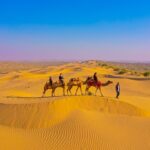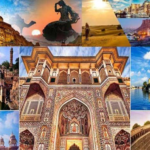Cultural Extravaganza: Festivals and Fairs of Rajasthan
Rajasthan, India’s land of kings, is renowned for its lively events and fairs, which are a stunning reflection of its abundant cultural heritage and traditional customs. Throughout the year, these gatherings draw in travelers from around the world, providing a glimpse into Rajasthan’s vivid tapestry of music, dance, art, and spirituality.
1. Pushkar Camel Fair
The Pushkar Camel Fair, held annually in the town of Pushkar, stands as one of Rajasthan’s most renowned celebrations. It blends cultural festivities with a massive camel and livestock fair, drawing visitors and traders alike. The fair typically occurs in October or November, coinciding with the Kartik Purnima full moon. It’s a kaleidoscope of colors and sounds, where traders gather to buy and sell camels, horses, and livestock. For tourists, it’s an opportunity to witness Rajasthan’s rural life in all its vibrancy.
At the heart of the Pushkar Camel Fair are numerous cultural events. Camel races, folk music performances, and dance competitions mesmerize audiences. The evenings are especially enchanting with the setting sun casting a golden hue over the sand dunes, while the night skies light up with traditional Rajasthani tunes and dance forms. The fair also hosts the unique spectacle of mustache competitions, showcasing the region’s proud tradition of elaborate facial hair.
The spiritual aspect of Pushkar adds another layer of significance to the fair. Pilgrims flock to the holy Pushkar Lake, believed to have been created by Lord Brahma, for ceremonial bathing during the fair. The lake’s ghats come alive with prayers and ceremonies, creating a serene and spiritual atmosphere amidst the festive bustle.
2. Jaipur Literature Festival
Contrasting with the rural charm of the Pushkar Camel Fair is the intellectual and literary feast that is the Jaipur Literature Festival. Held annually in January at Jaipur’s Diggi Palace, this festival has gained worldwide acclaim for its celebration of literature, art, and ideas. It brings together renowned authors, thinkers, and celebrities from around the world, making it one of Asia’s largest literary gatherings.
The Jaipur Literature Festival transcends its literary focus to include music, art, and theater. Visitors can attend readings and discussions by their favorite authors, participate in workshops, and explore the vibrant stalls selling books and handicrafts. The festival’s venues within the historical Diggi Palace add to its charm, offering a regal backdrop to intellectual discourse and cultural exchange.
One of the festival’s highlights is the Music Stage, which features performances ranging from traditional Rajasthani folk music to contemporary acts by renowned musicians. This blend of literary enlightenment and cultural entertainment makes the Jaipur Literature Festival a must-visit for enthusiasts of art, literature, and cultural dialogue.
3. Rajasthan International Folk Festival (RIFF)
Celebrating the state’s rich heritage of folk music and arts, the Rajasthan International Folk Festival (RIFF) takes place annually in Jodhpur’s Mehrangarh Fort. Held around October, RIFF attracts folk musicians, artists, and cultural enthusiasts from across the globe for a week-long celebration of Rajasthan’s traditional music forms.
Mehrangarh Fort, an imposing structure overlooking the Blue City of Jodhpur, provides a stunning backdrop for RIFF’s performances. Artists from Rajasthan’s diverse communities present a tapestry of music genres, including Manganiyar and Langas, accompanied by traditional instruments like the dholak, sarangi, and khartal. The festival’s evening performances under the starlit sky evoke a magical atmosphere, transporting audiences to a world of rustic melodies and soulful rhythms.
RIFF goes beyond music to include interactive sessions, workshops, and exhibitions showcasing Rajasthan’s folk arts. Visitors can engage with master craftsmen, learn traditional dance forms, and even participate in jam sessions with local musicians. The festival’s community-centric approach fosters cultural exchange and preserves Rajasthan’s folk heritage for future generations.
4. Teej Festival
Teej is a significant festival celebrated with great enthusiasm by women in Rajasthan, marking the onset of the monsoon season. It usually falls in July or August and is dedicated to Goddess Parvati, celebrating her reunion with Lord Shiva. The festival holds special cultural importance, especially in Jaipur, where it’s celebrated with elaborate processions and rituals.
The Teej procession through Jaipur’s Old City is a visual spectacle, featuring women dressed in vibrant traditional attire, carrying idols of Teej Mata (Goddess Parvati) adorned with flowers. The procession includes decorated elephants, camels, and horses, accompanied by folk dancers, musicians, and performers. It winds through the city streets, showcasing Rajasthan’s cultural richness and traditional values.
Women observe fasts on Teej day, praying for marital bliss and prosperity. They apply intricate henna designs on their hands and feet, wear green bangles, and adorn themselves with traditional jewelry. Cultural programs and competitions, including the best dressed Teej queen contest, add to the festive spirit. The festival culminates with women performing traditional dances like Ghoomar, a graceful dance form synonymous with Rajasthani culture.
5. Gangaur Festival
Gangaur is another important festival in Rajasthan, dedicated to Goddess Gauri, an embodiment of marital bliss and fidelity. It’s celebrated by married and unmarried women with great enthusiasm, usually in March or April, right after Holi. The festival spans several days, culminating in a grand procession in Jaipur and other cities.
During Gangaur, women create clay idols of Goddess Gauri and adorn them with colorful clothes and jewelry. These idols are worshipped in homes and temples, accompanied by rituals and prayers for the well-being of husbands and the prosperity of the family. Women observe fasts and sing traditional songs praising the goddess, while unmarried girls seek her blessings for a good husband.
The procession of Gangaur in Jaipur is a splendid affair, featuring women carrying idols of the goddess on their heads. The procession includes decorated elephants, horses, and camels, along with folk dancers and musicians performing lively Rajasthani folk music. The streets come alive with colors, music, and the aroma of traditional sweets and delicacies, creating a festive atmosphere that celebrates Rajasthan’s cultural heritage.
6. Elephant Festival
The Elephant Festival, held annually in Jaipur during Holi, celebrates the majestic pachyderm and its significance in Rajasthan’s cultural ethos. It’s a unique spectacle where elephants are adorned with vibrant colors, ornate jewelry, and painted motifs. The festival begins with a grand procession of decorated elephants, camels, and horses through the streets of Jaipur, accompanied by folk dancers and musicians.
One of the highlights of the Elephant Festival is the elephant beauty contest, where these gentle giants showcase their beauty and grace. They participate in races, tug-of-war competitions, and other cultural performances, highlighting their role in Rajasthan’s royal history. The festival’s atmosphere is festive, with locals and tourists alike enjoying the spectacle and participating in traditional games and activities.
Apart from elephant-related activities, the Elephant Festival features cultural performances, including Rajasthani folk music and dance. Visitors can indulge in traditional delicacies and shop for handicrafts and souvenirs at the festival stalls. The event concludes with a spectacular display of fireworks, illuminating the night sky and adding to the festive spirit of Holi celebrations in Jaipur.
7. Marwar Festival
The Marwar Festival, celebrated in Jodhpur in October, pays homage to the valor and martial traditions of Rajasthan’s rulers. It’s a two-day extravaganza showcasing the region’s folk music, dance, and cultural heritage. The festival is named after the Marwar region, historically known for its warrior clans and vibrant cultural ethos.
The Marwar Festival begins with a procession from Mehrangarh Fort to the Umaid Bhawan Palace, featuring beautifully attired performers, horses, and camels. The procession’s highlight is the cultural performances by folk artists, including Kalbeliya dancers, Langas, and Manganiyars, accompanied by traditional instruments like the dholak and sarangi. The festival’s atmosphere is lively, with competitions like turban tying and camel polo adding to the festivities.
Evenings at the Marwar Festival are dedicated to musical performances that celebrate Rajasthan’s musical heritage. Artists regale audiences with soulful renditions of traditional Rajasthani folk songs, evoking the spirit of desert life and Rajputana valor. The festival also includes craft bazaars where artisans display their skills in pottery, textile weaving, and traditional art forms, offering visitors a glimpse into Rajasthan’s artisanal legacy.
8. Desert Festival
The Desert Festival in Jaisalmer is a three-day extravaganza that celebrates the vibrant culture and traditions of Rajasthan’s desert communities. Held annually in January or February, the festival showcases the region’s folk music, dance, and artistic skills against the backdrop of Jaisalmer’s golden sand dunes.
The Desert Festival’s highlights include camel races, folk dance performances, and the Mr. Desert competition, where participants showcase their traditional attire and talents. The festival’s evenings are mesmerizing with cultural performances under the starlit sky, including Kalbeliya and Ghoomar dances accompanied by rhythmic music from traditional instruments like the khartal and morchang.
The festival also features activities like turban tying competitions, puppet shows, and craft bazaars where artisans display their craftsmanship in embroidery, mirror work, and leather craft. Visitors can indulge in Rajasthani delicacies like dal baati churma and shop for souvenirs ranging from camel leather products to traditional jewelry. The Desert Festival’s grand finale includes a sound and light show at the Jaisalmer Fort, illuminating the fort’s history and cultural significance.
Q1: What is the importance of the Pushkar Camel Fair in Rajasthan?
A1: The Pushkar Camel Fair is a popular event in Rajasthan, mixing cultural celebrations with a large camel and animals fair. It draws in visitors and investors worldwide, offering a look right into rural Rajasthan’s lively life in the middle of camel races, folk music, and dancing competitions.
Q2: Where and when does the Jaipur Literature Celebration occur?
A2: The Jaipur Literature Event is held yearly in January at Jaipur’s Diggi Royal residence. It celebrates literature, art, and ideas, including prominent authors, thinkers, and artists from worldwide, making it Asia’s largest literary event.
Q3: What makes the Rajasthan International Folk Festival (RIFF) significant?
A3: RIFF, held at Jodhpur’s Mehrangarh Fort around October, celebrates Rajasthan’s folk music and arts. It features performances by artists from diverse areas, interactive sessions, and workshops, fostering cultural exchange and maintaining Rajasthan’s rich heritage.
Q4: Describe the social relevance of the Teej Event in Rajasthan.
A4: Teej Event, celebrated enthusiastically by ladies in Rajasthan throughout July or August, marks the downpour period and honors Siren Parvati. It consists of colorful processions, fasting, conventional dances like Ghoomar, and routines praying for marriage joy and prosperity.
Q5: What is the Gangaur Event in Rajasthan recognized for?
A5: Gangaur Festival, observed in March or April, commemorates Goddess Gauri and is substantial for wedded and unmarried women in Rajasthan. It entails developing clay idols of the siren, vibrant processions, standard music, and prayers for domestic well-being and marriage bliss.
Q6: What is the Elephant Festival in Jaipur and when does it occur?
A6: The Elephant Celebration, held during Holi in Jaipur, honors elephants with dynamic decorations and social efficiencies. It consists of an elephant appeal contest, traditional songs, dancings like Ghoomar, and finishes with a grand fireworks show.
Q7: Where does the Marwar Event happen, and what does it celebrate?
A7: The Marwar Festival, celebrated in Jodhpur in October, honors Rajasthan’s martial traditions and folk culture. It includes processions, folk music by Kalbeliya and Manganiyar musicians, cultural competitions, and craft exhibits showcasing local art forms.
Q8: Describe the Desert Celebration in Jaisalmer and its highlights.
A8: The Desert Event in Jaisalmer, kept in January or February, commemorates Rajasthan’s desert society with camel races, folk dance efficiencies like Kalbeliya and Ghoomar, bandana linking competitions, and a grand finale at Jaisalmer Fort with a sound and light show.



